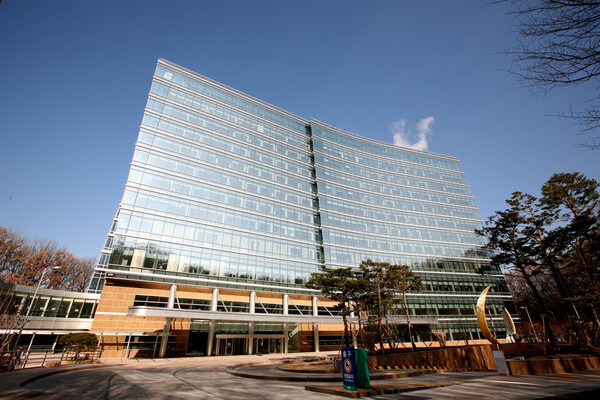A team of researchers from the Cancer Education Center at Samsung Medical Center (SMC) found that incorporating cancer education into the treatment process can improve cancer survival rates. Pictured is a view of the Comprehensive Cancer Center at SMC. (Courtesy of SMC)Cancer education has proved its effects “scientifically,” as patients who received cancer education at diagnosis had different mortality rates from those who did not.

A team of researchers led by Professor Cho Ju-hee of the Cancer Education Center and Professor Kang Dan-bee of the Clinical Epidemiology Research Center at Samsung Medical Center (SMC) said Monday that systematic cancer education can improve cancer survival rates if it is included in the treatment process.
According to the researchers, providing systematic education and support to patients who complain of distress at the time of cancer diagnosis can lower the risk of early death by 27 percent.
Distress is a generic term for the emotional challenges that cancer patients may experience, which falls on the bad side of the spectrum between good and bad stresses. It is very common at the time of a cancer diagnosis, along with depression and anxiety, with about 40 percent of cancer patients reportedly experiencing severe distress.
The researchers followed the one-year mortality rates of 4,880 patients newly diagnosed with cancer between July 2014 and December 2017. They experienced severe distress, including 810 who received cancer education and 4,070 who did not.
The results showed that the one-year mortality rate between the two groups was 5.5 percent per 1,000 person-years in the education intervention group, compared to 7.6 percent in the non-intervention group. This means that patients who received education had a lower risk of death within one year.
The mortality risk reduction was greater in younger patients. At age 60, the risk of death was 63 percent lower in patients under 50 and 54 percent lower in patients in their 50s.
These findings are in line with a study published last year in the Annals of Surgery by Professors Kim Hee-cheol and Shin Jung-kyong of the Colorectal and Anorectal Cancer Center, Professor Cho Ju-hee Cho from the Cancer Education Center, and Professor Kang Dan-bee from the Clinical Epidemiology Research Center at SMC.
The study found an association between stress and recurrence and death in patients with surgically curable colorectal cancer, with those with higher levels of stress having up to an 84 percent increased risk of recurrence and death.
That increased to 153 percent in stage 4 colon cancer patients, suggesting that managing stress is an important factor in patient care.
“The good prognosis of patients provided with appropriate education and support programs before cancer treatment confirms the need for and importance of cancer education in the treatment area,” Profess Cho said. “If the foundation is laid for active intervention by a variety of professionals, it can make a real contribution to improving the quality of life of cancer patients and increasing survival rates.”
The study was published in the latest issue of the Journal of Affective Disorders, the International Society for Affective Disorders official journal.
Build new model of cancer care under slogan of ‘healing beyond treatment’
Samsung Medical Center Cancer Hospital will build on these results to create a new patient-oriented comprehensive cancer treatment process. Following the launch of a stress counseling room in 2014, the hospital plans to upgrade its stress screening this year.
It will expand the scope to cancer and suspected cancer patients, increase patient accessibility with mobile questionnaires, and develop algorithms to manage patients according to their conditions actively.
In this process, comorbidities related to cancer treatment, including pain and sleep, are treated at cancer healing centers, and those at high risk of depression are automatically referred to mental health clinics.
In addition, SMC will assign veteran nurses as “first caregivers” to help patients with pre-treatment counseling and strengthen the activities of social workers in the stress counseling room to help patients with their difficult situations.
“As we are recognized as a hospital that is already good at cancer treatment, we will create a new cancer treatment model that thinks about healing beyond treatment to relieve the physical and mental pain and fear faced by patients and their families and improve their quality of life,” said Lee Woo-yong, president of the Samsung Comprehensive Cancer Center.
In 2018, SMC opened the first cancer education center in Korea and was the first to introduce wellness education for cancer patients as part of the treatment process.
The center provides education on understanding cancer and treatment methods, side effect management, psychosocial support, and daily life during and after treatment to help patients and their families manage stress and cope with the disease.
The Cancer Education Center provides education on understanding treatment, symptom management, psychosocial support, stress management education, mentoring programs, chemotherapy and radiation therapy, grooming, art therapy, music therapy, laughter therapy, gardening therapy, and sex education for couples with cancer.
Currently, 22 classes are offered online and offline, and 138 educational materials are provided to patients. On average, six hundred patients participate in the program per month.
Related articles
- Over 80% of global population experiences hemorrhoids. But when must you see a doctor?
- ‘Inoperable colorectal cancer patients can now live 20-50 months longer’
- Nearly 50% of Koreans experience moderate to high chronic embitterment: study
- Debunking myths about colorectal cancer: expert clarifies misconceptions on constipation, polyps, and diet
- Depression in old age spurs the onset of multiple chronic diseases: study

